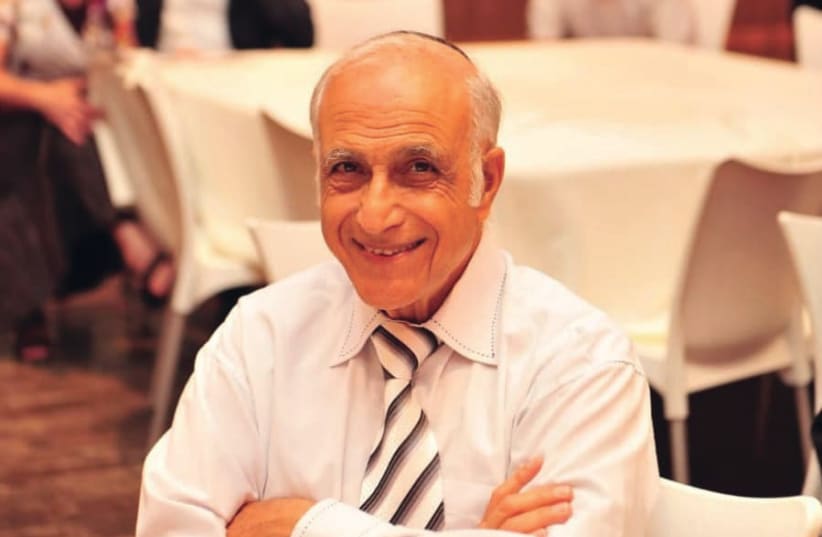When The Report’s editor Steve Linde kindly asked if I could write a piece about my grandfather, Joseph Manasseh, I jumped at the chance. In many ways, his story is Israel’s story.
His mother, Maatuqa, meaning Bracha in Hebrew, was born in Persia, and wed into the Jewish-Iraqi Sassoon family at the age of 12 in an arranged marriage. Her husband was much older, in his forties. Though they had two children, they divorced and Maatuqa remarried a man named Gavriel Menashe.
In 1933 or 1934 – records are unclear – they had a son, Joseph.
As anti-Jewish persecution intensified in the years before the Farhud pogrom, mother Maatuqa and grandmother Aziza fled Iraq with baby Joe. Like so many other Baghdadi Jews, they fled for British-ruled India, an attractive destination due to the notable lack of antisemitism there, and the fact that it let Jews enter freely. After arriving in Bombay, the family eventually settled in Calcutta.
Joe had a happy but poor childhood. The family was prosperous in Iraq, but as Jews were not permitted to open Iraqi bank accounts, cash was poured into real estate. In his later years, Joe would speak of the family owning seven properties in Iraq. Departing with just the clothes on their backs, his family was left destitute. Nevertheless, they made themselves at home in Calcutta’s warm, traditional Jewish community.
At 15, Joe left India. Promised a chance to build the Land of Israel and pursue higher education, he was taken by the Jewish Agency’s Aliyat HaNoar program to several secular kibbutzim, among them Gal’ed and Hulda. Reality did not meet expectation. Those were tough years, with Israel in its infancy. The youths performed back-breaking work, paving roads, toiling in the fields and doing other menial tasks, working tirelessly over long days.
Initially, the secular Ashkenazi kibbutznikim didn’t know what to make of the Indian Jews - they were shocked to discover that these eastern immigrants weren’t as ‘primitive’ as expected, and knew all the American and English songs. Along the way, he was told he need not keep religious law now he was living in the Holy Land, and he left religion for some time.
For five years he helped build the country, and proudly served in the army as a lone soldier, without the support framework that exists today. With nowhere to go in his free time, Joe spent hours traveling up and down the country as buses were free, marveling in awe at the rate of the country’s construction.
Upon his discharge from the army, Joe sought employment in order to save money for university, as promised years earlier. But he couldn’t find a job, and felt he was being discriminated against because he was Sephardi. Ashkenazi army friends interviewing for the same jobs were given opportunities, but he was repeatedly turned down.
Eventually, he decided to leave Israel, but was warned by the Jewish Agency that he would have to repay his original ticket to Israel. In desperation, he sold the watch he received from his mother and grandmother as a bar mitzvah present to help fund his ticket out of the country.
Disappointed that people like him were not given the support needed to advance, Joe left in the mid-1950s with a heavy heart, vowing never to return.
He was granted free entry to Britain as his sister had helped the British against the Germans as a telephonist in World War II. He worked odd jobs at first, but eventually was given a chance to enter the gemstone trade in London’s jewelry hub, Hatton Garden. It was a hard business to break into, with merchants unwilling to trust lending their precious jewels to a stranger.
But those who knew Joe say everywhere he worked people fell in love with his charming nature and knew they could trust him. Once, when a courier was robbed of stones belonging to another business, Joe repaid the sum in full out of his own pocket, thus buying his good name in the industry. The reputation lasted a lifetime.
After a chance meeting with a rabbi on a train, Joe’s religious flame was rekindled. He later met his wife-to-be Leila at a dance for Jewish singles. With her encouragement, he became observant again. The two were married in 1961. Back then, the marriage of an Asheknazi girl from London to an Indian-Israeli of Sephardi descent raised eyebrows. “What if he already has a wife overseas?” Leila would remember the community’s concerns.
Despite his earlier experiences, Israel remained close to Joe’s heart. Years later in 1967, as he was on a business trip in Hong Kong, Israel found itself fighting on multiple fronts. Suddenly Joe felt a yearning to help his people. “For a few stupid idiots, why should I be so angry?” he would later recall. He quickly booked a flight to Israel, but the war was already over by the time he arrived.
The two had four children together. Years later, three of them moved to Israel and convinced him that the country had progressed. In 1999, Joe broke his promise and came home to Israel, together with his wife Leila.
In retirement, Joe fulfilled his dream, studying Torah regularly, giving money to charity and volunteering with Leila in Netanya’s Laniado hospital. Their devotion earned them a prize from the city’s mayor.
Even in his eighties, he would walk 20 minutes each way to the Kiryat Sanz hassidic community to attend a late morning minyan. After being diagnosed with Alzheimer’s, Joe experienced a slow decline but his larger-than-life nature never changed, loving nothing more than making others smile and being with family.
Over the last year, his condition deteriorated rapidly and a few months before his passing, he made one last journey – to Kibbutz Lavi to be near his daughter. On Tuesday, October 5, his odyssey came to an end in Israel, the country he proudly called home.
